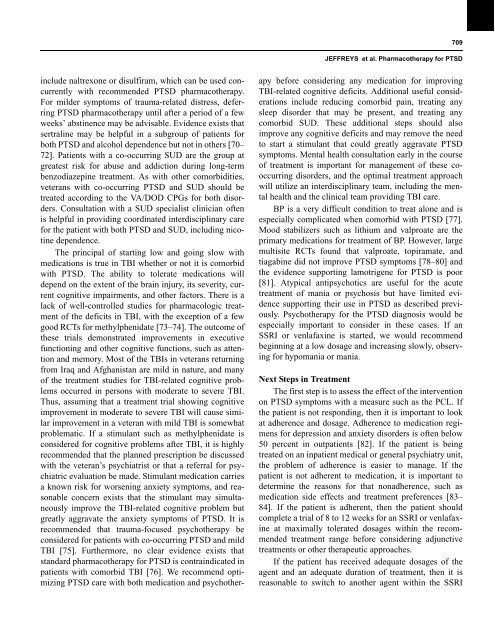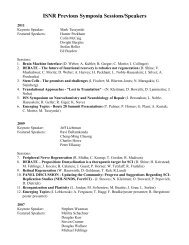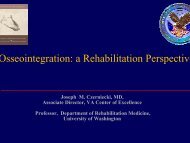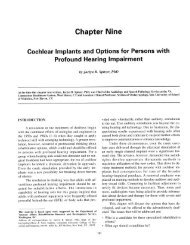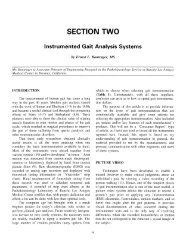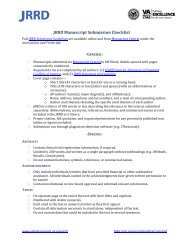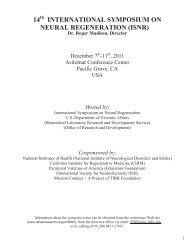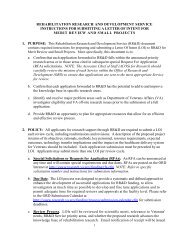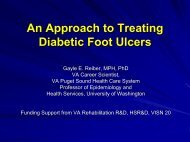Pharmacotherapy for posttraumatic stress disorder - Rehabilitation ...
Pharmacotherapy for posttraumatic stress disorder - Rehabilitation ...
Pharmacotherapy for posttraumatic stress disorder - Rehabilitation ...
Create successful ePaper yourself
Turn your PDF publications into a flip-book with our unique Google optimized e-Paper software.
include naltrexone or disulfiram, which can be used concurrently<br />
with recommended PTSD pharmacotherapy.<br />
For milder symptoms of trauma-related di<strong>stress</strong>, deferring<br />
PTSD pharmacotherapy until after a period of a few<br />
weeks’ abstinence may be advisable. Evidence exists that<br />
sertraline may be helpful in a subgroup of patients <strong>for</strong><br />
both PTSD and alcohol dependence but not in others [70–<br />
72]. Patients with a co-occurring SUD are the group at<br />
greatest risk <strong>for</strong> abuse and addiction during long-term<br />
benzodiazepine treatment. As with other comorbidities,<br />
veterans with co-occurring PTSD and SUD should be<br />
treated according to the VA/DOD CPGs <strong>for</strong> both <strong>disorder</strong>s.<br />
Consultation with a SUD specialist clinician often<br />
is helpful in providing coordinated interdisciplinary care<br />
<strong>for</strong> the patient with both PTSD and SUD, including nicotine<br />
dependence.<br />
The principal of starting low and going slow with<br />
medications is true in TBI whether or not it is comorbid<br />
with PTSD. The ability to tolerate medications will<br />
depend on the extent of the brain injury, its severity, current<br />
cognitive impairments, and other factors. There is a<br />
lack of well-controlled studies <strong>for</strong> pharmacologic treatment<br />
of the deficits in TBI, with the exception of a few<br />
good RCTs <strong>for</strong> methylphenidate [73–74]. The outcome of<br />
these trials demonstrated improvements in executive<br />
functioning and other cognitive functions, such as attention<br />
and memory. Most of the TBIs in veterans returning<br />
from Iraq and Afghanistan are mild in nature, and many<br />
of the treatment studies <strong>for</strong> TBI-related cognitive problems<br />
occurred in persons with moderate to severe TBI.<br />
Thus, assuming that a treatment trial showing cognitive<br />
improvement in moderate to severe TBI will cause similar<br />
improvement in a veteran with mild TBI is somewhat<br />
problematic. If a stimulant such as methylphenidate is<br />
considered <strong>for</strong> cognitive problems after TBI, it is highly<br />
recommended that the planned prescription be discussed<br />
with the veteran’s psychiatrist or that a referral <strong>for</strong> psychiatric<br />
evaluation be made. Stimulant medication carries<br />
a known risk <strong>for</strong> worsening anxiety symptoms, and reasonable<br />
concern exists that the stimulant may simultaneously<br />
improve the TBI-related cognitive problem but<br />
greatly aggravate the anxiety symptoms of PTSD. It is<br />
recommended that trauma-focused psychotherapy be<br />
considered <strong>for</strong> patients with co-occurring PTSD and mild<br />
TBI [75]. Furthermore, no clear evidence exists that<br />
standard pharmacotherapy <strong>for</strong> PTSD is contraindicated in<br />
patients with comorbid TBI [76]. We recommend optimizing<br />
PTSD care with both medication and psychother-<br />
709<br />
JEFFREYS et al. <strong>Pharmacotherapy</strong> <strong>for</strong> PTSD<br />
apy be<strong>for</strong>e considering any medication <strong>for</strong> improving<br />
TBI-related cognitive deficits. Additional useful considerations<br />
include reducing comorbid pain, treating any<br />
sleep <strong>disorder</strong> that may be present, and treating any<br />
comorbid SUD. These additional steps should also<br />
improve any cognitive deficits and may remove the need<br />
to start a stimulant that could greatly aggravate PTSD<br />
symptoms. Mental health consultation early in the course<br />
of treatment is important <strong>for</strong> management of these cooccurring<br />
<strong>disorder</strong>s, and the optimal treatment approach<br />
will utilize an interdisciplinary team, including the mental<br />
health and the clinical team providing TBI care.<br />
BP is a very difficult condition to treat alone and is<br />
especially complicated when comorbid with PTSD [77].<br />
Mood stabilizers such as lithium and valproate are the<br />
primary medications <strong>for</strong> treatment of BP. However, large<br />
multisite RCTs found that valproate, topiramate, and<br />
tiagabine did not improve PTSD symptoms [78–80] and<br />
the evidence supporting lamotrigene <strong>for</strong> PTSD is poor<br />
[81]. Atypical antipsychotics are useful <strong>for</strong> the acute<br />
treatment of mania or psychosis but have limited evidence<br />
supporting their use in PTSD as described previously.<br />
Psychotherapy <strong>for</strong> the PTSD diagnosis would be<br />
especially important to consider in these cases. If an<br />
SSRI or venlafaxine is started, we would recommend<br />
beginning at a low dosage and increasing slowly, observing<br />
<strong>for</strong> hypomania or mania.<br />
Next Steps in Treatment<br />
The first step is to assess the effect of the intervention<br />
on PTSD symptoms with a measure such as the PCL. If<br />
the patient is not responding, then it is important to look<br />
at adherence and dosage. Adherence to medication regimens<br />
<strong>for</strong> depression and anxiety <strong>disorder</strong>s is often below<br />
50 percent in outpatients [82]. If the patient is being<br />
treated on an inpatient medical or general psychiatry unit,<br />
the problem of adherence is easier to manage. If the<br />
patient is not adherent to medication, it is important to<br />
determine the reasons <strong>for</strong> that nonadherence, such as<br />
medication side effects and treatment preferences [83–<br />
84]. If the patient is adherent, then the patient should<br />
complete a trial of 8 to 12 weeks <strong>for</strong> an SSRI or venlafaxine<br />
at maximally tolerated dosages within the recommended<br />
treatment range be<strong>for</strong>e considering adjunctive<br />
treatments or other therapeutic approaches.<br />
If the patient has received adequate dosages of the<br />
agent and an adequate duration of treatment, then it is<br />
reasonable to switch to another agent within the SSRI


